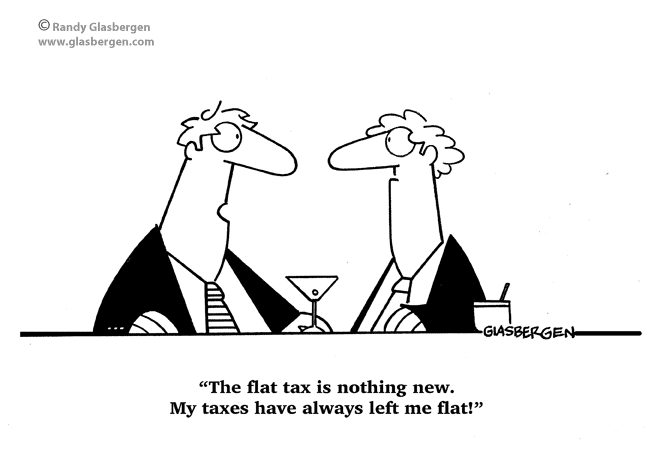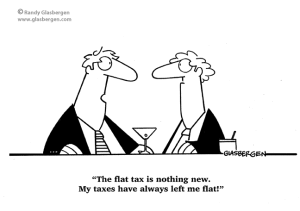
A Flat Tax Would Be Simple…Right?
March 4, 2014Student Blogs ArticleThe U.S. Tax Code is certainly a loathed and confusing mess amassing to approximately 74,000 pages. That is a whopping 185 times larger than the Tax Code was in 1913, which was about 400 pages. If the U.S. Tax Code befuddles you, don’t worry. Even Albert Einstein found the income tax to be difficult stating, “the hardest thing in the world to understand is the income tax.” But alas, the 16th Amendment of the U.S. Constitution allows Congress to have “power to lay and collect taxes on incomes, from whatever source derived . . .”, and the U.S. Tax Code is the user manual.
Many advocates of tax reform embrace the so-called “flat tax”. Proponents of the flat tax propose that it would be simpler and fairer than the current progressive tax. It would be simpler because all income for individuals’ would be taxed at one rate. In its pure form, the flat tax would disallow tax exclusions, deductions, and credits. Proponents argue that the flat tax is fairer because all individuals would be subject to the exact same tax rate, instead of a low-income earners being taxed at a lower rate and a high-income earners being taxed at a higher rate. Whether the flat tax is indeed fair is a much more subjective inquiry than whether the flat tax is simpler than the current U.S. tax system. For that reason this article will focus on the latter.
I agree that in its pure form the flat tax would be simpler than the current U.S. tax system, nevertheless is a pure flat tax really attainable? And if so, would it even be desirable? The answer to both is likely no. The current U.S. Tax Code is full of exclusions and deductions to gross income as well as credits to tax liability. In fact, all of the exclusions, deductions, and credits constitute a hefty portion of the tax code. Some examples of these tax breaks include exclusion of gifts, exclusion of proceeds from health insurance, deductions for charitable donations, deductions for payment of student loan interest and so on. There are good policy reasons behind many exclusions, deductions, and credits including the promotion of education and encouraging health insurance coverage among many others. It is because of these policy reasons that many elected officials and lawmakers may be swayed to alter the pure flat tax.
Elected officials are representatives of their constituents and are responsible for adequately and accurately reflecting the desires of their constituents in the development of social policy, among many other things. It would be naïve to think that elected officials and lawmakers would not feel pressure from constituents, lobbyists, political groups, etc. to legislate additional tax breaks in future years. This would create tax exclusions, deductions, and credits adding complexity to the once simple flat tax. Just because the tax rate changes, the tax rate does not alter the substantive nature of what tax is. Taxes will still remain a hot-button issue and Americans will still want to keep as much income in their pockets as possible.
Would the flat tax even be desirable? In its pure form, the flat tax would do away with all exclusions, deductions, and credits. Employee provided health care and insurance tax breaks alone constituted approximately $132 billion in 2011. With a pure flat tax system, the $132 billion would be subject to income tax. Experts calculate that a pure flat tax would decrease the number of people who are insured by between 5.5 million to 14.3 million. Doing away with the charitable donation deduction may also incentivize Americans to give less to charities and non-profit organizations that depend on charitable contributions to function. These are just a few examples of ways in which a flat tax may negatively impact American society.
Overall, the flat tax has some popular appeal. The U.S. Tax Code is long, confusing, and complex, whereas the flat tax promises simplicity and fairness. While the flat tax may be attractive on its’ face, don’t forget the details. For example: How will it be implemented? Realistically, will the flat tax really make taxes simpler? What additional costs will be placed on American’s if tax exclusions, deductions, and credits are eliminated? Will exclusions, deductions, and credits truly be eliminated? U.S. tax reform is likely a good thing, but basing that reform on a flat tax may not be the best option from a practical standpoint. A better route may be to modify the current U.S. Tax Code; perhaps taking out superfluous, outdated, or confusing language and organizing the provisions in a more methodical way, in order to make the code more readily accessible and easy to understand.
You may also like
- March 2025
- February 2025
- November 2024
- October 2024
- April 2024
- March 2024
- February 2024
- November 2023
- October 2023
- April 2023
- March 2023
- February 2023
- January 2023
- December 2022
- November 2022
- October 2022
- May 2022
- April 2022
- March 2022
- February 2022
- January 2022
- December 2021
- November 2021
- October 2021
- May 2021
- April 2021
- March 2021
- February 2021
- January 2021
- November 2020
- October 2020
- September 2020
- August 2020
- July 2020
- June 2020
- May 2020
- April 2020
- March 2020
- February 2020
- January 2020
- November 2019
- October 2019
- September 2019
- April 2019
- February 2019
- December 2018
- November 2018
- October 2018
- September 2018
- March 2018
- February 2018
- January 2018
- December 2017
- November 2017
- October 2017
- September 2017
- May 2017
- April 2017
- March 2017
- February 2017
- December 2016
- November 2016
- October 2016
- April 2016
- March 2016
- February 2016
- January 2016
- December 2015
- November 2015
- October 2015
- June 2015
- May 2015
- April 2015
- March 2015
- February 2015
- January 2015
- December 2014
- November 2014
- October 2014
- August 2014
- March 2014
- February 2014
- January 2014
- December 2013
- November 2013
- October 2013
- September 2013
- May 2013
- April 2013
- March 2013
- February 2013
- January 2013
- December 2012
- November 2012
- October 2012
- September 2012
- June 2012
- April 2012
- March 2012
- February 2012
- January 2012
- December 2011
- November 2011
- October 2011
- September 2011
- August 2011
- April 2011
- March 2011
- November 2010
- October 2010
- September 2010
